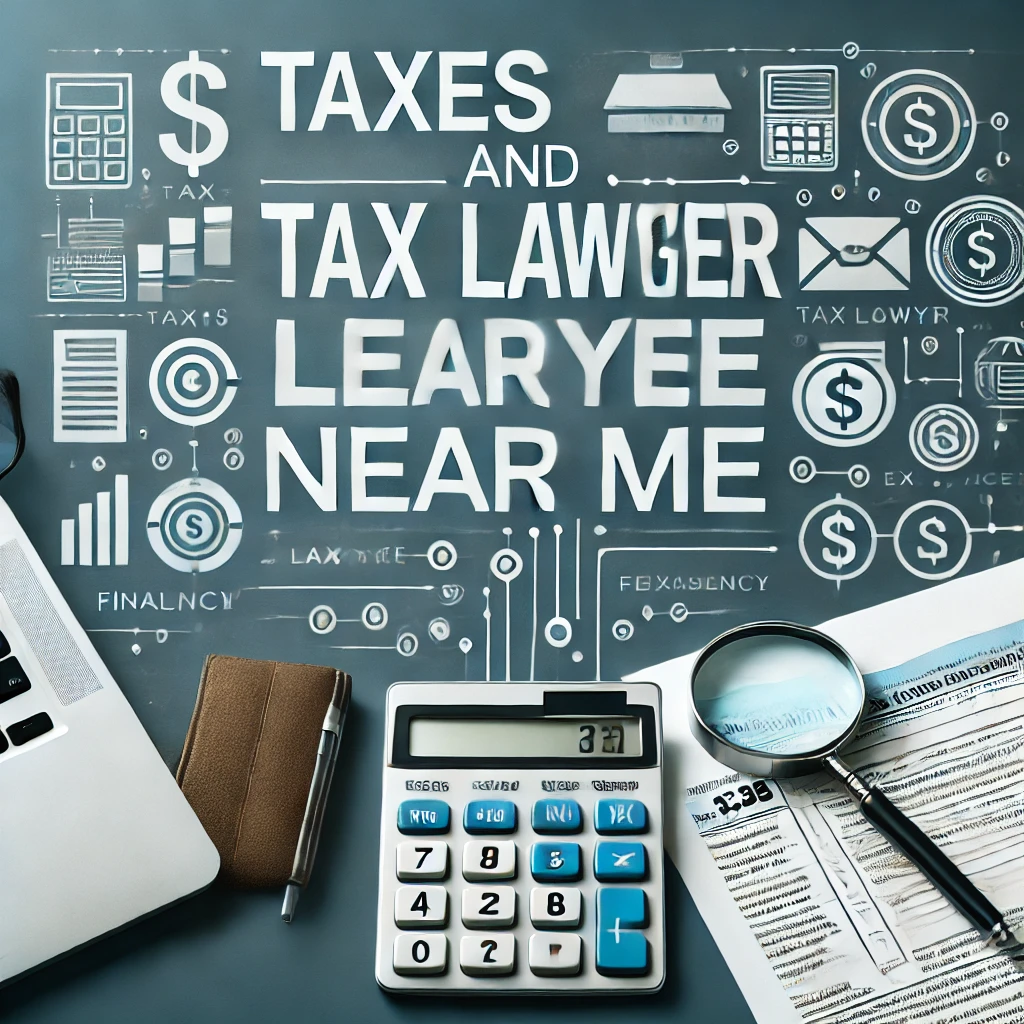Taxes and Tax Lawyer Near Me: Everything You Need to Know
Navigating taxes can be daunting, whether you’re an individual or a business owner. Tax laws are complex, and even a small error can result in fines or audits. This is where finding a reliable tax lawyer near me can be a game-changer. In this guide, we’ll cover everything about taxes, how tax lawyers can help, and tips to find the best legal expert for your needs.
Table of Contents
- Introduction to Taxes
- Why You Need a Tax Lawyer Near Me
- Common Tax Issues That Require a Lawyer
- How to Find the Best Tax Lawyer Near Me
- Key Qualities of a Good Tax Lawyer
- Services Offered by Tax Lawyers
- For Individuals
- For Businesses
- Benefits of Hiring a Tax Lawyer
- Common Questions About Taxes and Tax Lawyers Near Me
- Conclusion
Introduction to Taxes
Taxes are an unavoidable part of life. Whether you’re earning a salary, running a business, or managing an estate, taxes play a significant role in shaping financial decisions. Unfortunately, understanding tax laws can be a challenge due to their intricate details and frequent updates.
Common Types of Taxes
- Income Tax: Tax on earnings from work or investments.
- Corporate Tax: Levied on businesses’ profits.
- Property Tax: Tax on property ownership.
- Sales Tax: A tax on goods and services purchased.
- Estate and Gift Tax: Taxes on inheritance and large monetary gifts.
Mistakes in filing or understanding these taxes can lead to audits, penalties, or even legal action. This is where a tax lawyer near me can help by providing expert guidance and representation.
Why You Need a Tax Lawyer Near Me
Hiring a tax lawyer can save you from legal troubles and optimize your financial planning. While accountants handle tax preparation, tax lawyers specialize in legal issues related to taxes.
Common Tax Issues That Require a Lawyer
- IRS Audits: Facing an audit can be stressful. A tax lawyer ensures compliance and represents you during the process.
- Tax Debt Relief: Struggling with unpaid taxes? A lawyer can negotiate on your behalf for reduced penalties.
- Tax Evasion Charges: Legal representation is critical if you’re accused of avoiding taxes.
- Estate Planning: Tax lawyers help minimize estate taxes while ensuring your assets are distributed as per your wishes.
- International Tax Laws: If you have overseas income or businesses, a lawyer can navigate complex international tax laws.
How to Find the Best Tax Lawyer Near Me
Finding a qualified tax lawyer can seem overwhelming, but with the right approach, you can secure reliable help.
Taxes and Tax Lawyer Near Me
Key Qualities of a Good Tax Lawyer
- Specialization: Look for lawyers specializing in tax law rather than general practitioners.
- Experience: Choose someone with a proven track record in handling cases like yours.
- Reputation: Check online reviews, ratings, and referrals from trusted sources.
- Accessibility: A lawyer nearby is ideal for quick consultations and meetings.
- Transparent Fees: Ensure the lawyer is upfront about their fees and billing structure.
Steps to Locate a Tax Lawyer Near Me
- Search Online: Use keywords like “tax lawyer near me” to find local professionals.
- Check Legal Directories: Websites like Avvo or Justia provide lists of certified lawyers by location.
- Consult with Multiple Lawyers: Interview at least three lawyers to compare expertise and fees.
- Ask for Referrals: Friends, family, or colleagues may recommend reliable lawyers.
Services Offered by Tax Lawyers
For Individuals
- Tax Dispute Resolution: Handling disputes with the IRS or state tax agencies.
- Estate Planning: Structuring wills and trusts to minimize tax liabilities.
- Tax Relief: Negotiating reduced payments for unpaid taxes.
For Businesses
- Corporate Tax Compliance: Ensuring adherence to tax laws.
- International Taxation: Managing taxes for multinational operations.
- Audit Defense: Representing businesses during IRS audits.
Benefits of Hiring a Tax Lawyer
Hiring a tax lawyer offers several advantages that go beyond filing taxes. Here’s why they’re indispensable:
- Legal Expertise: Tax lawyers understand the intricate details of tax law, which can save you from costly errors.
- Audit Defense: If the IRS audits you, a lawyer can represent your interests.
- Strategic Planning: They provide strategies to reduce tax liabilities while remaining compliant.
- Risk Mitigation: Avoid penalties and legal issues through expert advice.
- Confidentiality: Unlike accountants, conversations with lawyers are protected by attorney-client privilege.

Taxes and Tax Lawyer Near Me
Common Questions About Taxes and Tax Lawyers Near Me
1. When Should I Hire a Tax Lawyer?
- If you’re facing an audit or legal action from the IRS.
- When you have significant tax debt and need relief.
- For complex financial transactions or estate planning.
2. How Much Do Tax Lawyers Charge?
Fees vary based on the complexity of the case and the lawyer’s experience. Expect hourly rates ranging from $200 to $500 or more.
3. Can a Tax Lawyer Help With Back Taxes?
Yes, they can negotiate with the IRS to reduce penalties, establish payment plans, or settle debts.
4. What’s the Difference Between a Tax Lawyer and an Accountant?
While accountants focus on preparing taxes, lawyers handle legal issues such as disputes, audits, and tax planning strategies.
5. Are Tax Lawyers Worth the Cost?
If you’re dealing with significant legal or financial issues, a tax lawyer can save you money and protect you from legal consequences.
Internal Links to Explore More
- Understanding Tax Brackets and How They Work
- Top Budgeting Tips to Save for Taxes
- Estate Planning Basics: Wills vs. Trusts
- How to Avoid IRS Penalties
Taxes
Navigating the complexities of tax law can be challenging, but finding a reliable tax lawyer near me makes the process manageable. Whether you’re an individual managing your personal finances or a business owner dealing with corporate taxes, hiring a tax lawyer ensures compliance, reduces liability, and provides peace of mind.
Start your search today to connect with a qualified tax lawyer near you. By taking proactive steps, you can protect yourself from legal troubles and make informed financial decisions. Taxes don’t have to be stressful—with the right help, you can turn them into an opportunity for strategic growth.
Need expert advice? Find a trusted tax lawyer near you and secure your financial future today!
Additional Tips for Finding the Best Tax Lawyer Near Me
1. Look for Local Expertise
When searching for a “tax lawyer near me,” prioritize lawyers familiar with your state’s specific tax laws. Each state has unique tax codes, and a local expert ensures compliance and understands local tax authorities.
2. Verify Credentials
Ensure your chosen tax lawyer is licensed to practice and holds certifications like the Certified Tax Specialist (CTS) or a Juris Doctor degree specializing in tax law.
3. Assess Communication Skills
The best tax lawyers are excellent communicators who explain complex tax issues in understandable terms. Schedule a consultation to gauge their ability to clarify your concerns.
4. Ask About Past Cases
Request case studies or examples of similar issues they’ve handled. Success in past cases can provide confidence in their ability to resolve your tax issues effectively.
5. Consider Technological Support
Inquire whether the lawyer uses modern tools for tax management, such as software for compliance tracking or cloud-based solutions for document sharing.
Red Flags to Avoid When Choosing a Tax Lawyer
While finding the right tax lawyer is crucial, knowing what to avoid is equally important. Watch out for:
- Unrealistic Guarantees: No lawyer can guarantee a specific outcome. Be wary of those who promise results without understanding your situation.
- Hidden Fees: Ensure the lawyer provides a transparent fee structure upfront.
- Lack of Specialization: Avoid general practice lawyers who don’t specialize in tax law.
- Poor Communication: If the lawyer is hard to reach or dismissive during the consultation, consider other options.
Tax Lawyer Alternatives: Do You Always Need a Lawyer?
While tax lawyers are invaluable for legal issues, other professionals might suffice in certain situations. Here’s how they compare:
1. Certified Public Accountants (CPAs)
- Best For: Tax preparation, bookkeeping, and basic tax advice.
- Limitations: Not equipped to handle legal disputes or audits.
2. Enrolled Agents (EAs)
- Best For: Representing clients before the IRS in audits or appeals.
- Limitations: Limited expertise in legal matters compared to tax lawyers.
3. Tax Consultants
- Best For: General tax advice and planning.
- Limitations: Typically not authorized to represent you in legal proceedings.
Understanding How Tax Lawyers Handle Common Issues
1. Resolving Tax Audits
Tax lawyers analyze your financial records, identify discrepancies, and represent you during IRS meetings. They ensure compliance with tax laws while minimizing potential penalties.
2. Negotiating Installment Agreements
If you owe back taxes, a tax lawyer can negotiate with the IRS for a manageable payment plan, ensuring you avoid wage garnishments or liens.
3. Managing International Tax Compliance
For those with overseas investments or income, a tax lawyer navigates treaties, foreign tax credits, and compliance regulations, reducing the risk of double taxation.
4. Handling Tax Penalties
Tax lawyers review your case to determine if penalties were imposed unfairly. They file penalty abatement requests, citing reasonable cause or procedural errors by the IRS.
5. Estate Tax Planning
For high-net-worth individuals, tax lawyers create strategies to minimize estate taxes through trusts, gifting, and charitable donations.
The Role of Technology in Tax Law Services
Tax lawyers increasingly rely on technology to streamline their services. Here’s how modern tools improve efficiency:
- Tax Compliance Software: Tools like UltraTax or TaxSlayer simplify tax filings and ensure accuracy.
- Data Analytics: Software analyzes financial records for inconsistencies, helping lawyers prepare for audits.
- Document Management Systems: Cloud-based platforms like Clio ensure secure storage and easy access to legal documents.
- Virtual Consultations: Video conferencing tools allow clients to connect with tax lawyers remotely, enhancing accessibility.

How to Prepare for a Meeting With a Tax Lawyer Near Me
To make the most of your consultation, come prepared with the following:
- Financial Records: Bring tax returns, bank statements, and any relevant financial documents.
- List of Questions: Prepare a list of questions or concerns to ensure all your issues are addressed.
- Details of the Case: Summarize the problem, including any correspondence from the IRS or state tax agencies.
- Goals and Expectations: Be clear about your desired outcomes, whether it’s reducing penalties, resolving a dispute, or minimizing future tax liabilities.
DIY Tax Filing vs. Hiring a Tax Lawyer
When DIY Filing Works
- Simple returns with one or two sources of income.
- No complex deductions, investments, or foreign income.
- Access to online tax software like TurboTax or H&R Block.
When You Need a Tax Lawyer
- Facing an audit or legal dispute.
- Large tax debts with penalties.
- Complex financial portfolios or international assets.
- Starting a business or managing corporate taxes.
Real-Life Scenarios Where Tax Lawyers Made a Difference
1. Case Study: Small Business Audit
A local bakery faced an IRS audit for misreporting income. The owner hired a tax lawyer who discovered errors in bookkeeping and successfully negotiated reduced penalties, saving the business $20,000.
2. Case Study: Estate Tax Reduction
An individual with a $10 million estate consulted a tax lawyer. By setting up trusts and charitable donations, the lawyer reduced estate taxes by $1.5 million.
3. Case Study: Resolving Back Taxes
A freelance graphic designer owed $50,000 in back taxes. Their tax lawyer negotiated an offer in compromise, reducing the debt to $12,000.
The Future of Tax Law: Trends to Watch
- Increased Digitalization: Expect more tax lawyers to adopt AI tools for legal research and predictive analysis.
- Focus on International Taxation: As globalization continues, tax lawyers specializing in cross-border compliance will be in demand.
- Remote Services: Virtual consultations and digital case management will become standard practices.
Internal Links for Further Learning
- How to Choose the Best Tax Preparation Software
- 10 Common Tax Mistakes to Avoid
- Step-by-Step Guide to Filing Taxes for Freelancers
- The Role of Trusts in Estate Planning
Taxes
Conclusion
Navigating taxes can be overwhelming, but finding a reliable tax lawyer near me simplifies the process and protects your financial interests. From resolving disputes to minimizing tax liabilities, tax lawyers provide invaluable expertise and representation.
Don’t wait for tax season to seek help—proactively consult with a tax lawyer to ensure compliance, reduce risks, and optimize your finances. Use this guide to start your search today and take control of your financial future. With the right tax lawyer by your side, you can confidently navigate even the most complex tax situations.
Ready to take the next step? Contact a trusted tax lawyer near you and secure your peace of mind today.
Additional FAQs About Taxes and Tax Lawyers Near Me
To address common concerns and provide clarity, here are more frequently asked questions about taxes and hiring a tax lawyer:
1. What is the difference between a tax attorney and a CPA?
- Tax Attorney: Specializes in legal aspects of taxes, including disputes, audits, and complex planning. They provide legal representation and advice.
- CPA (Certified Public Accountant): Focuses on preparing and filing tax returns, bookkeeping, and financial audits. They are typically not trained to handle legal tax disputes.
When to Choose:
- Hire a CPA for day-to-day tax preparation and filing.
- Hire a tax attorney for legal issues, complex disputes, or strategic planning.
2. Can a tax lawyer help me with state taxes?
Yes, tax lawyers are well-versed in both federal and state tax laws. Whether you’re dealing with property taxes, income taxes, or state audits, a tax lawyer can provide assistance.
Examples:
- Navigating discrepancies in state tax filings.
- Defending against audits conducted by state revenue departments.
- Reducing penalties on overdue state taxes.
3. What should I bring to my first meeting with a tax lawyer?
To ensure a productive consultation, gather the following:
- Tax Returns: Bring the last three years’ worth of tax filings.
- IRS Notices: Include any correspondence or notices you’ve received.
- Financial Records: Bank statements, investment reports, and income statements.
- Questions or Concerns: Prepare a list to guide the discussion.
4. How can I lower my chances of an IRS audit?
While there’s no guaranteed way to avoid an audit, the following tips can reduce your risk:
- File Accurately: Double-check your tax return for errors.
- Report All Income: Include income from side hustles, freelance work, and investments.
- Avoid Red Flags: Excessive deductions, home office claims, or unusually high expenses relative to income can trigger audits.
- Hire a Professional: A tax lawyer or CPA ensures compliance and accuracy in your filings.
5. Are tax lawyer fees tax-deductible?
In some cases, tax lawyer fees may be tax-deductible if they are related to:
- Tax planning for your business.
- Resolving tax disputes or audits.
- Legal advice on deductible expenses.
Consult with your tax attorney or CPA to confirm deductibility.
6. How do I know if a tax lawyer is qualified?
To verify a tax lawyer’s qualifications:
- Check Licensing: Ensure they’re licensed to practice in your state.
- Review Certifications: Look for credentials such as CTS (Certified Tax Specialist) or an LLM in Taxation.
- Read Reviews: Online platforms like Avvo or Martindale-Hubbell provide client feedback.
- Request References: Ask for referrals from previous clients.
7. Can a tax lawyer help with cryptocurrency taxes?
Yes, tax lawyers are increasingly specializing in cryptocurrency taxation. They can help:
- Report gains and losses accurately on your tax return.
- Navigate evolving regulations regarding crypto assets.
- Defend against audits related to cryptocurrency transactions.
8. Do I need a tax lawyer if I’m self-employed?
It depends on your financial situation:
- Hire a Tax Lawyer: If you have significant deductions, are facing audits, or have complex income streams.
- Hire a CPA: For routine tax preparation and bookkeeping.
9. What is an Offer in Compromise (OIC), and how can a tax lawyer help?
An Offer in Compromise (OIC) allows taxpayers to settle tax debts for less than the full amount owed. A tax lawyer can:
- Assess your eligibility.
- Prepare and submit your application.
- Negotiate with the IRS to secure the best possible terms.
10. What happens if I don’t pay my taxes?
Failure to pay taxes can lead to:
- Penalties: Fines and interest on unpaid amounts.
- Wage Garnishments: The IRS may withhold a portion of your paycheck.
- Liens: A legal claim on your property.
- Seizures: The IRS can seize assets to cover unpaid taxes.
A tax lawyer can intervene to mitigate these consequences and negotiate a repayment plan.
11. Can I represent myself in a tax dispute with the IRS?
While you can represent yourself, it’s not recommended for complex disputes. Tax laws are intricate, and a qualified tax lawyer has the expertise to:
- Present your case effectively.
- Negotiate with IRS agents.
- Identify procedural errors in the IRS’s case against you.
12. What is the penalty for tax evasion?
Tax evasion is a serious crime with penalties such as:
- Fines of up to $100,000 for individuals or $500,000 for corporations.
- Imprisonment of up to five years.
- Repayment of unpaid taxes with interest.
Hiring a tax lawyer early can help reduce penalties or negotiate lesser charges.
Additional Tips for Staying Tax-Compliant
1. Keep Detailed Records
Maintain organized records of all income, expenses, and tax-related documents for at least seven years.
2. Use Tax Software
Leverage tools like TurboTax, H&R Block, or QuickBooks for accurate filings.
3. Educate Yourself
Stay updated on tax laws, especially if you’re self-employed or own a business.
4. Hire a Professional
A CPA or tax lawyer can ensure accuracy and compliance, reducing stress and saving money in the long run.
Internal Links for Deeper Insights
- How to Minimize Tax Liability Legally
- The Top Tax Deductions for Small Business Owners
- Estate Planning Tips to Save on Taxes
- Understanding IRS Audits: A Complete Guide
Final Thoughts
Taxes can be complex, but they don’t have to be overwhelming. By hiring a reliable tax lawyer near me, you can tackle challenges confidently, protect your finances, and navigate tax laws effectively. With their expertise, you’ll minimize liabilities, resolve disputes, and secure peace of mind.
Take control of your taxes today. Use this guide to connect with a trusted tax lawyer near you and ensure your financial future is on solid ground.



